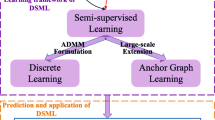Abstract
Recently, a reasonable and effectively framework to deal with the classification problem of the polysemy object with complex connotation is multi-instance multi-label (MIML) learning framework in which each example is not only represented by multiple instances but also associated with multiple labels. As we all know, feature expression plays an important role in the classification problems. It determines the accuracy of the classification results from the source. Considering its difficulties for automatically extracting the high-level features which are useful and noiseless for the MIML problem, so in this paper we present a general MIML framework by combining the feature learning technologies with machine learning technologies. Further, based on this framework, a new approach called CPNMIML which combines the probabilistic latent semantic analysis (PLSA) with the neural networks (NN) is proposed. In CPNMIML algorithm, we firstly learn the latent topic allocation of all the training examples by using the PLSA model, it is a feature learning process to get high-level features. Then we utilize the learned latent topic allocation of each training example to train the neural networks. Given a test example, we learn its latent topic distribution. Finally, we send the learned latent topic allocation of the test example to the trained neural networks to get the multiple labels of the test example. Experiments show that the proposed method has superior performance on two real-world MIML tasks.





Similar content being viewed by others
References
Andrews S, Tsochantaridis L, Hofmann T (2003) Support Vector machines for multiple-instance learning. In: Advances in Neural Information Procession Systems 15, MA: MIT Press, 561–568
Bishop CM (2006) Pattern recognition and machine learning[M]. Springer, New York, pp 1–749
Boutell MR, Luo J, Shen X, Browm CM (2004) Learning multi-label scene classification[J]. Pattern Recogn 37(9):1757–1771
Csurka G, Dance CR, Fan L et al (2004) Visual Categorization with Bags of Keypoints. In: GrenoBle Workshop on Pattern Recognition and Machine Learning in Computer Vision, 116
Dietterich TTG, Lathrop RH, Lozano-Perez T (1997) Solving the multiple-in-stace problem with axis-parallel rectangles[j]. Artif Intell 89(1):31–71
Han D, Li W, Li Z (2008) Semantic image classification using statistical local spatial relations model. Multimed Tools Appl 39(2):169–188
Haykin S (2004) Neural Networks[M].Ye S-W, Shi Z-Z translate. Bejing: Machine Industry Press. pp 1–72
Hofmann T (2001) Unsupervised learning by propabilistic latent semantic analysis[J]. Mach Learn 42(1):177–196
Kang F, Jin R, Sukthankar R (2006) Correlated label propagation with application to multi-lab- el learning. In: Proceedings of IEEE International Conference on Computer Vision and Pattern Recognition, 1719–1726
Maron O (1998) Learning from ambiguity[D]. MIT, MA, pp 1–120
Maron O, Lozano-Perez T (1997) A framework for Multiple-Instance learning. In: Advances in Neural Information Processing Systems 10, 1–7
Ojala T, Pietikainen M, Maenpaa T (2002) Multiresolution gray-scale and rotation invariant texture classification with local binary patterns[J]. IEEE Trans Pattern Anal Mach Intell 24(7):1–17
Rumelhart DE, Hinton GE, Williams RJ (1985) Learning internal representations by error propagation[R]. MA: MIT Press, 1:1–49
Schmidhuber J (2015) Deep learning in neural networks: an overview [j]. Neural Netw 61:85–1117
Sebastiani F (2001) Machine learning in automated text categorization[J]. ACM Comput Surv 34(1):1–47
Xie J-Y, Jiang S, Xie W et al (2011) An efficient global K-means clustering algorithm[J]. J Comput 6(2):271–279
Xu X, Frank E (2004) Logistic regression and boosting for labeled bags of instances. Lect Notes Comput Sci 3056:272–281
Zha Z-J, Hua X-S, Mei T, Wang J, Qi G-J, Wang Z (2008) Joing Multi-Label Multi-Instance Learning for Image Classification. In: Proceedings of the IEEE Computer Society Conference on Vision and Pattern Recognition, 1–6
Zhang M-L A k-Nearest neighbor based multi-instance algorithm[R]. Nanjing: National Key Laboratory for Novel Software Technology, NanJing University,1–6
Zhang Q, Sally A (2001) Goldman.EM-DD: an improved multiple-instance learning technique. Adv Neural Inf Process Syst, 1–8
Zhang M-L, Wang Z-J (2009) MIMLRBF: RBF neural networks for multi-instance multi-label learning[J]. Neurocomputing 72(16):3951–3956
Zhang M-L, Zhou Z-H (2006) Multi-label neural Net-works with applications to functional genomics and text categorization[J]. IEEE Trans Knowl Data Eng 18(10):1338–1351
Zhang M-L, Zhou Z-H Multi-label learning[R], Nanjing: National Key Laboratory for Novel Software Technology, Nanjing University, 1–21
Zhou Z-H Multiple-instance learning: a survey. Nanjing: National Key Laboratory for Novel Software Technology, Nanjing University, 1–31
Zhou Z-H, Zhang M-L (2002) Neural networks for multi-instance learning[R]. AI Lab, Computer Science and Technology Department, Nanjing University, Nanjing, pp 1–14
Zhou Z-H, Zhang M-L (2007) Multi-instance multi-label learning with application to scene classification. Adv Neural Inf Process Syst 19:1609–1616
Zhou Z-H, Zhang M-L, Huang S-J, Li Y-F (2011) Multi-instance multi-label learning[J]. Artif Intell 176(1):2291–2320
Acknowledgments
The author would like to thank the anonymous reviewers for their insightful reading and comments which would help much in improving the quality of this paper. This work is supported by the National Natural Science Foundation of China (Nos. 61165009, 61262005, 61363035, 61365009), the National Basic Research Program of China (No. 2012CB326403), the Guangxi Natural Science Foundation (Nos. 2012GXNSFAA053219, 2013GXNSFAA019345, 2014GXNSFAA118368) and the “Bagui Scholar” Project Special Funds.
Author information
Authors and Affiliations
Corresponding author
Rights and permissions
About this article
Cite this article
Yan, K., Li, Z. & Zhang, C. A New multi-instance multi-label learning approach for image and text classification. Multimed Tools Appl 75, 7875–7890 (2016). https://doi.org/10.1007/s11042-015-2702-6
Received:
Revised:
Accepted:
Published:
Issue Date:
DOI: https://doi.org/10.1007/s11042-015-2702-6




